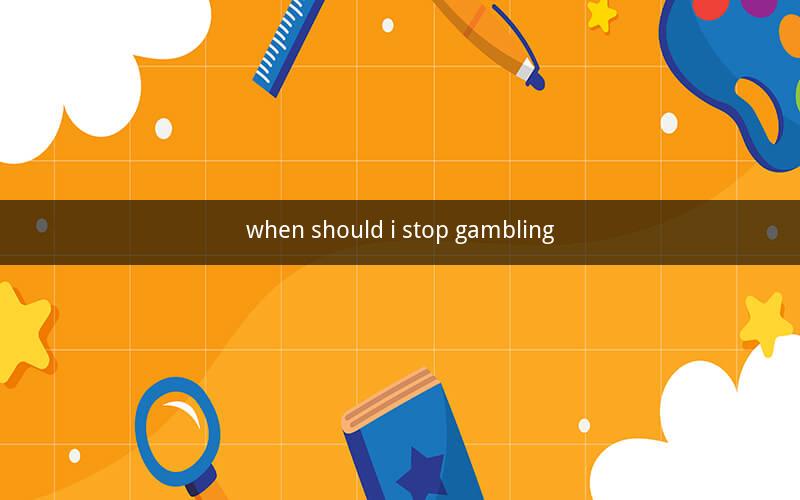
Table of Contents
1. Understanding the Problem
2. Identifying the Signs
3. The Importance of Self-Reflection
4. Seeking Professional Help
5. Building a Support System
6. Setting Realistic Goals
7. Coping with Triggers
8. Developing Healthy Habits
9. Embracing a New Lifestyle
10. Staying Committed
1. Understanding the Problem
Gambling can be an enjoyable pastime for many, but for some, it can quickly become an addiction. Recognizing when to stop gambling is crucial in preventing financial, emotional, and social consequences. Understanding the problem is the first step towards overcoming it.
1. Identifying the Signs
Several signs indicate that it may be time to put an end to gambling. These include:
- Financial Problems: Difficulty paying bills, borrowing money, or selling personal belongings to fund gambling.
- Emotional Distress: Feeling guilty, ashamed, or anxious about gambling.
- Social Consequences: Strained relationships with family and friends, or missing work or social events due to gambling.
- Physical Symptoms: Insomnia, fatigue, or other physical symptoms caused by stress or lack of sleep.
1. The Importance of Self-Reflection
Self-reflection is a powerful tool in determining whether it's time to stop gambling. Ask yourself the following questions:
- Am I spending more time and money on gambling than I should?
- Is my gambling affecting my work, relationships, or health?
- Do I feel compelled to keep gambling despite negative consequences?
1. Seeking Professional Help
If you're struggling to control your gambling, seeking professional help is essential. Therapists, counselors, and support groups can provide guidance and support. Additionally, some organizations offer treatment programs specifically designed for gambling addiction.
1. Building a Support System
A strong support system can make a significant difference in overcoming gambling addiction. This may include family, friends, or support groups. Sharing your struggles and seeking advice from others who have experienced similar challenges can be incredibly beneficial.
1. Setting Realistic Goals
Setting realistic goals is crucial in overcoming gambling addiction. Start by identifying small, achievable goals, such as:
- Reducing the amount of money spent on gambling.
- Limiting the time spent gambling.
- Avoiding trigger situations.
1. Coping with Triggers
Triggers can make it difficult to resist the urge to gamble. Identify your triggers and develop strategies to cope with them, such as:
- Avoiding places where you're tempted to gamble.
- Changing your routine to avoid trigger situations.
- Seeking support from friends or family when you feel vulnerable.
1. Developing Healthy Habits
Developing healthy habits can help you stay focused on your goals and reduce the urge to gamble. Consider the following:
- Engaging in physical activity regularly.
- Eating a balanced diet.
- Getting enough sleep.
- Practicing relaxation techniques.
1. Embracing a New Lifestyle
Overcoming gambling addiction requires embracing a new lifestyle. This may involve:
- Reconnecting with family and friends.
- Pursuing hobbies and interests.
- Focusing on personal growth and development.
1. Staying Committed
Staying committed to your goals is essential in overcoming gambling addiction. Remember that it's a process, and setbacks are possible. Be patient with yourself and seek support when needed.
10 Questions and Answers
1. Q: How do I know if I have a gambling problem?
A: Look for signs such as financial problems, emotional distress, social consequences, and physical symptoms.
2. Q: Can I overcome a gambling addiction on my own?
A: It's possible, but seeking professional help and support from others can significantly improve your chances of success.
3. Q: What should I do if I feel the urge to gamble?
A: Identify your triggers and develop strategies to cope with them, such as avoiding trigger situations or seeking support from friends or family.
4. Q: Are there any medications that can help with gambling addiction?
A: Some medications may help manage symptoms of gambling addiction, but they are not a cure. Consult with a healthcare professional for guidance.
5. Q: Can I gamble responsibly?
A: It's possible to gamble responsibly, but it's essential to set limits and be aware of the risks.
6. Q: How can I rebuild my relationships after a gambling addiction?
A: Be open and honest with your loved ones, and work on rebuilding trust and communication.
7. Q: Can I recover from a gambling addiction?
A: Yes, many people recover from gambling addiction with the right support and commitment.
8. Q: How long does it take to overcome a gambling addiction?
A: The duration of recovery varies for each individual, but it's a lifelong process.
9. Q: What if I relapse?
A: Relapse is a common part of the recovery process. Seek support, learn from your mistakes, and continue working towards your goals.
10. Q: Is there a support group for people with gambling addiction?
A: Yes, many organizations offer support groups for people with gambling addiction. These groups can provide valuable guidance and support.